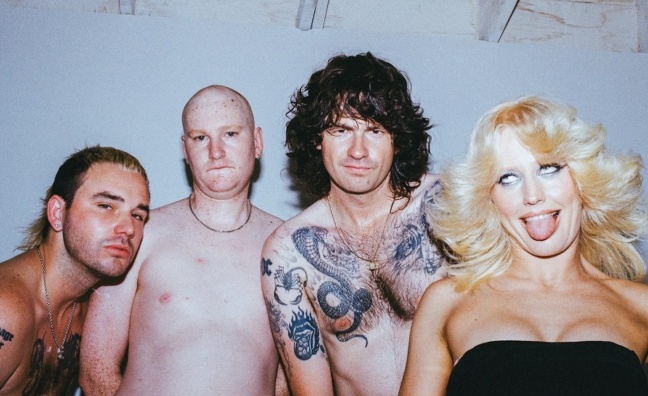Amyl And The Sniffers believe that their story shows that anything is possible in the music industry.
The Australian punk band have just released their third album Cartoon Darkness via Rough Trade, which was at No.7 in Music Week’s latest Midweek Sales Flash.
Singer and lyricist Amy Taylor, guitarist Declan Martens, bassist Gus Romer and drummer Bryce Wilson have spoken to Music Week about their rise, which was sparked by a performance at The Great Escape Festival in Brighton in 2018 and has taken in support slots with the likes of Foo Fighters, Green Day, Liam Gallagher and more.
“It shows that even though a lot of small venues are shutting down and stuff’s really tough, it doesn’t mean that music is just dead, kaput, the end,” said Taylor of their success so far. “It is possible to not have to work a normal job and make music and contribute to a community.”

In our feature for Music Week’s November edition, the band considered their increasing mainstream appeal.
“When I was watching the Foo Fighters play, I was analysing the set so scientifically, trying to learn their tricks, but then I’d turn around and see some person bawling their eyes out,” said Martens. “And you’re like, ‘Fuck, all these songs have different meanings to people.’ That’s what’s really special about the mainstream. So I’d like that for us, but at the same time, I think those artists probably have a really tough job.”
“It seems hard to sell us to the mainstream,” the guitarist added. “We talk funny – in about 99% of the world we sound weird, and we look weird.”
“And I don’t sing traditionally,” said Taylor. “Sure, there are a couple of songs where I do, but it’s like a toad in a blender having to yell over some solos.”
Taylor also reflected on using her platform to spread a positive message, and spoke about the industry’s issues with discrimination, representation and equality.
“Getting groped by people and talked down to is not exclusive to the music industry, but I feel like the music industry is less and less and less tolerant of people who are cheeky bastards,” she said.
“Even just in our time being musicians I’ve seen it change – things that used to be radical now don’t seem as radical. Even pop musicians, they actually talk about feminist issues now.”
“Women always have a lot of pressure to talk about being a woman, hold the political space, be strong and talk about stuff that’s been hard or bad,” she continued. “But I don’t ever want people to stop seeing a woman on stage having fun, enjoying her life and just being free, being able to laugh and appreciate style, dressing up and glamour. I think a lot of people expect me to be able to hold the fort for everybody and I’m happy to, but I also want to do that by saying, ‘Hey, bitches, you can just have fun tonight.’”
Taylor said that using her platform makes her feel stronger.
“I do it in a way which is inviting, it doesn’t isolate people,” she said. “I don’t really judge people if they don’t know certain things, even though people have been screaming the same things for years, and they could have been listening, but everyone has a different path to get to where they can understand something.”
With regards to their industry experience, Taylor – who used to study music business – offered a positive outlook.
“I’m not anti-industry,” she said. “A lot of bands are and I can understand why, but we haven’t had a negative experience with it. Sure, we’ve had bad experiences, but that’s pretty natural in human interaction.”
“I like being on top of what we do; the more knowledge you can have, the better,” she added. “I can hold my own and make sure that we’re being looked after alright, which we are.”
Our interview touched heavily on the sometimes harsh reality of life in a touring band in the streaming age.
“The music industry is struggling a lot,” said Taylor. “With streaming, live is the only income, and not many people are buying physical [music] or merch, shows are way more expensive and punters don’t have the money to pay for tickets. People can access music for free, and there’s less of a willingness to go to live shows.”

The singer also pointed out that “Australian bands have to travel so much further than English and European bands”.
“For us it was always, ‘You go on tour for four months because that’s what it takes to break even,’’ she said. “We’ve worked really hard for a lot of years, as lots of bands do, and the shows are getting bigger, so it is equalling out a little better. We used to tour for four months at a time, six shows a week, whereas now we say we only want to tour for three weeks at a time, so that we can have rest.”
The band play three sold out nights at London’s Roundhouse in November as part of a UK tour, while next summer they support Fontaines DC at Finsbury Park before a headline appearance at Alexandra Palace.
Geoff Travis and Jeannette Lee, co-owners of Rough Trade, were effusive in their praise.
“We are trained to recognise a great band and that was what we saw in front of us – a great band with one of the greatest frontpersons in the history of rock’n’roll,” said Travis. “What more could one want?”
“With a band as enigmatic and thrilling as they are it’s a no-brainer,” Lee told us. “You see them live and leave the venue on a high every time. They’re unpretentious, fearless and proud of their roots, all qualities I admire greatly.”
Read the full interview, also featuring co-managers Simone Ubaldi and Andrew Parisi, in the new issue of Music Week, out now. Subscribers can read it online here.
PHOTO: John Angus Stewart












